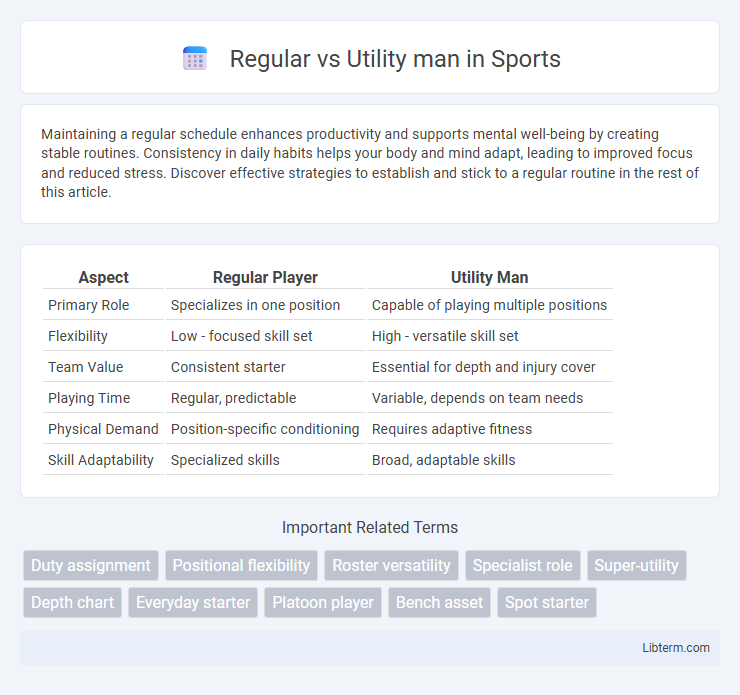Maintaining a regular schedule enhances productivity and supports mental well-being by creating stable routines. Consistency in daily habits helps your body and mind adapt, leading to improved focus and reduced stress. Discover effective strategies to establish and stick to a regular routine in the rest of this article.
Table of Comparison
| Aspect | Regular Player | Utility Man |
|---|---|---|
| Primary Role | Specializes in one position | Capable of playing multiple positions |
| Flexibility | Low - focused skill set | High - versatile skill set |
| Team Value | Consistent starter | Essential for depth and injury cover |
| Playing Time | Regular, predictable | Variable, depends on team needs |
| Physical Demand | Position-specific conditioning | Requires adaptive fitness |
| Skill Adaptability | Specialized skills | Broad, adaptable skills |
Understanding the Roles: Regular vs Utility Man
A Regular player specializes in a specific position, mastering the skills and responsibilities required to perform consistently in that role. In contrast, a Utility man offers versatility by covering multiple positions, providing tactical flexibility and depth to the team roster. Understanding these distinct roles highlights the strategic balance between specialized expertise and adaptable support within team dynamics.
Key Differences Between Regular and Utility Workers
Regular workers typically have a defined job role with specialized skills and consistent responsibilities, leading to focused expertise in their specific area. Utility workers, in contrast, perform a variety of tasks across different functions, offering flexible labor support but with broader, less specialized skills. The key difference lies in specialization versus versatility, where regular workers maintain consistent duties while utility workers adapt to multiple roles as needed.
Job Descriptions: Regular Employee vs Utility Man
Regular employees typically have defined job roles specific to their department, performing specialized tasks such as accounting, marketing, or production. Utility men serve as versatile workers handling various support duties like maintenance, equipment setup, cleaning, and assisting multiple departments as needed. The utility man's role emphasizes flexibility and broad skill sets, while regular employees focus on expertise within a particular function or discipline.
Work Flexibility: Which Role Offers More?
Utility men typically offer greater work flexibility by handling a variety of tasks across multiple trades, adapting quickly to different job requirements. Regular workers usually specialize in a specific trade or function, providing consistent expertise but less variability in daily duties. The versatility of a utility man allows for fluctuating schedules and diverse assignments, making this role more suitable for dynamic work environments.
Skills Required for Regular vs Utility Man
A regular man typically requires specialized skills in a specific trade such as carpentry, plumbing, or electrical work, with in-depth knowledge and certifications relevant to that discipline. A utility man must possess a broad range of versatile skills, including basic maintenance, repair, and troubleshooting across multiple systems like HVAC, electrical, and general facility upkeep. Both roles demand technical proficiency, but the utility man emphasizes adaptability and multi-tasking, while the regular man focuses on expert craftsmanship in one area.
Compensation and Benefits Comparison
Regular employees often receive a comprehensive compensation package including a fixed salary, health insurance, retirement plans, and paid leave, reflecting their ongoing commitment and job stability. Utility men, typically employed on a temporary or as-needed basis, usually receive hourly wages with limited or no access to benefits such as health coverage or retirement contributions. The disparity in compensation and benefits highlights the greater financial security associated with regular employment compared to the flexible but less protected status of utility workers.
Career Growth: Opportunities in Both Roles
Regular and utility men both offer distinct career growth opportunities within skilled trades, with regular men typically specializing in a specific trade allowing for deeper expertise and advancement into supervisory or technical specialist roles. Utility men gain broader exposure across multiple trades, enhancing versatility and increasing chances for becoming multi-trade supervisors or project coordinators. Employers value regular men for precision and consistent skill, while utility men are prized for adaptability and comprehensive system knowledge, both pathways leading to robust career development.
Workplace Expectations and Responsibilities
Regular employees are expected to maintain consistent attendance, adhere to standardized work hours, and fulfill role-specific duties with accountability for long-term projects and team collaboration. Utility workers are typically assigned flexible tasks across various departments, requiring adaptability to shifting schedules and diverse responsibilities that prioritize operational support. Employers anticipate reliability and skill versatility from utility workers, while regular employees must demonstrate specialized expertise and sustained performance in defined roles.
Pros and Cons: Regular Employee vs Utility Man
Regular employees benefit from job security, consistent wages, and access to company benefits such as health insurance and retirement plans. Utility men offer flexibility and specialized skills for diverse tasks, reducing staffing costs but lack job stability and benefits. The choice depends on organizational needs for long-term commitment versus temporary, cost-effective labor solutions.
Choosing the Right Path: Factors to Consider
Choosing between a regular employee and a utility man hinges on project scope, skill specialization, and long-term versus short-term needs. Regular employees offer consistent expertise and stability, which benefits companies requiring ongoing, specialized labor. Utility men provide flexibility and multi-tasking abilities, ideal for fluctuating workloads and diverse maintenance tasks, impacting hiring decisions based on operational demands and budget constraints.
Regular Infographic

 libterm.com
libterm.com